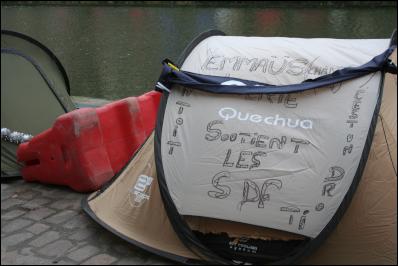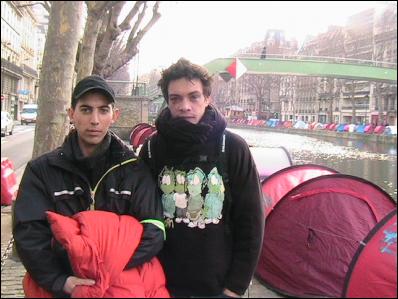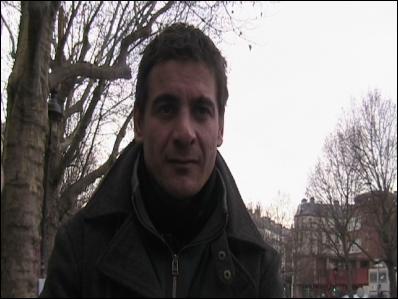Les Yeux on France: Homeless In Paris
Les Yeux on France: Homeless Force Politicians to Act
*******
![]() Scoop Audio: Click here to listen to
this edition of Les Yeux on France.
Scoop Audio: Click here to listen to
this edition of Les Yeux on France.
In just one week, an organisation going by the name of ‘the Children of Don Quixote’ has finally achieved what others have been pushing for years: firm political resolve to combat homelessness and the lack of sufficient social housing in France. Their campaign has centered on over 200 tents pitched on either side of the fashionable Canal Saint-Matin, Paris, since 16 December 2006. Similar camps have popped up in many urban centres across the country.
PARIS – January 2007 – France’s homeless have been joined by many ‘well-housed’ French citizens, who have spent one night or several on the street to show their solidarity for the cause. Protesters are calling on citizens and politicians to sign the ‘Canal Saint-Martin Charter’, a list of urgent measures to deal with the homeless issue. As of 2 January, all major political parties had signed the charter, excluding the far-right National Front.

Tents line Canal Saint-Martin.
Official estimates put France’s homeless population at approximately 86,000. In addition, there are an estimated 3 million people without proper accommodation. They live on the street, stay with friends or family, or live in substandard hotels and caravans. Campaigners insist that there is a shortfall of nearly 1 million social dwellings. In a recent BVA poll, 48 per cent of people said they believed it was possible they may one day become homeless.
Nabila has been homeless for 10 years. ‘I’ve had enough of it’, she sighs. She has 2 children, who don’t live with her, and says her disability prevents her from working. Nabila’s time on the streets has been peppered with stays in 5 different hostels. What she wants, however, is somewhere she can live with her children. She’s put in a request for state housing but has no response.

Quentin, 26, and Sebastien, 25, are homeless.'
Quentin is 26 and his friend Sebastien 25. They are part of the growing phenomena of young people forced to live on the streets due to unemployment and/or expensive rent. Both men want to work, but as Quentin argues: ‘You need an address to get a job, and a job to get an address. If you don’t have one you can’t get the other. It’s a cycle, it’s always that way. You get stuck there.’
They say that the conditions in existing hostels are so bad that they feel safer camping on the streets. ‘There’s drug addicts and people with mental problems, and problems with stealing’, says Sebastien. ‘I’ve never been in a hostel and don’t want to.’ Quentin says they have joined the symbolic camp because they want to see ‘some humanity in the cities’.
The Children of Don Quixote was formed by actor Augustin Legrand and his brothers, Joseph and Jean-Baptiste, along with their friend, fellow actor Pascal Oumaklouf. Pascal says it began on 24 October 2006, when the group ‘slept in boxes under bridges with the homeless.’

Actor Pascal Oumaklouf is one of the founders of the Children of Don Quixote.
They made a series of video portraits on some of the homeless to challenge stereotypes. ‘After 15 days we made a blog and tried to show the French public that the SDFs who were in the street are no longer tramps, its people who’ve had a major upset in their lives: the loss of a wife, a job, a work-related injury… And that anyone could all of a sudden become homeless. It’s ridiculous that we continue to have someone die on the footpath each evening. It’s [2007] and we’re in a wealthy country.’
After this project was completed, the group decided to set up a camp to force the issue into the public eye. They developed upon a project ‘Médecins du Monde’ had undertaken the winter before, distributing bright red tents to the homeless. This year the camp was on a grander, more coordinated scale. Attempts to camp out at Place de la Concorde and then Place de la Bastille were thwarted by police. It was third time lucky for Children of Don Quixote at Canal Saint-Martin. Amandine Herpe, a student, had already spent 15 days sleeping in a tent when Scoop spoke to her. Amandine is one of the normally ‘well-housed’ at the camp. She describes the camp as a ‘call to French citizens to denounce the intolerable’.
‘You see a homeless guy on the corner of the street and you take no notice. Here we are all assembled and you can really see how many of us there are’ explains Quentin. ‘If you wander around you’ll see that there are guys here who are trilingual, qualified chefs, accountants, all that.’
The results have been dramatic. Protesters are very optimistic about the massive surge of political goodwill that they have witnessed in the New Year. The camp dominated media attention over the Christmas break, to the point that President Jacques Chirac spoke in support of the right to housing in his New Year’s eve speech.
Following a key demand of the Canal Saint-Martin Charter, Prime Minister Dominique de Villepin has proposed a new law which will make housing an enforceable right. A draft law which would grant legal redress to those unable to find apartments is to be presented to the cabinet on 17 January.
‘This is a principle which will put the right to housing on same level as the right to medical care or education,’ Villepin told media. ‘It will make France one of the most advanced countries in the area of social rights.’ The law would allow homeless people to sue public authorities for accommodation. It is to be introduced gradually and would be applicable to all French citizens by 2012.
Meanwhile, the two main candidates for the presidency have also put their two cents in. Right-wing Nicolas Sarkozy used the opportunity to soften his image. His promise that there would be no homeless people left two years into his term as president was met with a fair amount of skepticism. Socialist candidade Ségolène Royal has taken a more cautious approach and has instead linked the issue to wider poverty and economic insecurity.
Yasmine Ryan is a graduate of the University of Auckland, in Political Studies and French language. She is currently completing a Masters degree in International Journalism at the Institut d’Etudes Politiques, Aix-en-Provence.
ENDS


 Keith Rankin: Remembering New Zealand's Missing Tragedy
Keith Rankin: Remembering New Zealand's Missing Tragedy Gordon Campbell: On Why The Regulatory Standards Bill Should Be Dumped
Gordon Campbell: On Why The Regulatory Standards Bill Should Be Dumped Martin LeFevre - Meditations: Psychedelics, Mystical Experiencing, And Organized Religion
Martin LeFevre - Meditations: Psychedelics, Mystical Experiencing, And Organized Religion Keith Rankin: Equity Rights - UBI, SUI, BUI, HUI, Or GUI?
Keith Rankin: Equity Rights - UBI, SUI, BUI, HUI, Or GUI? Binoy Kampmark: The Inevitable Souring - Elon Musk Falls Out With Donald Trump
Binoy Kampmark: The Inevitable Souring - Elon Musk Falls Out With Donald Trump Ian Powell: Postscript On Ethnic Cleansing, Genocide And New Zealand Recognition Of Palestine
Ian Powell: Postscript On Ethnic Cleansing, Genocide And New Zealand Recognition Of Palestine